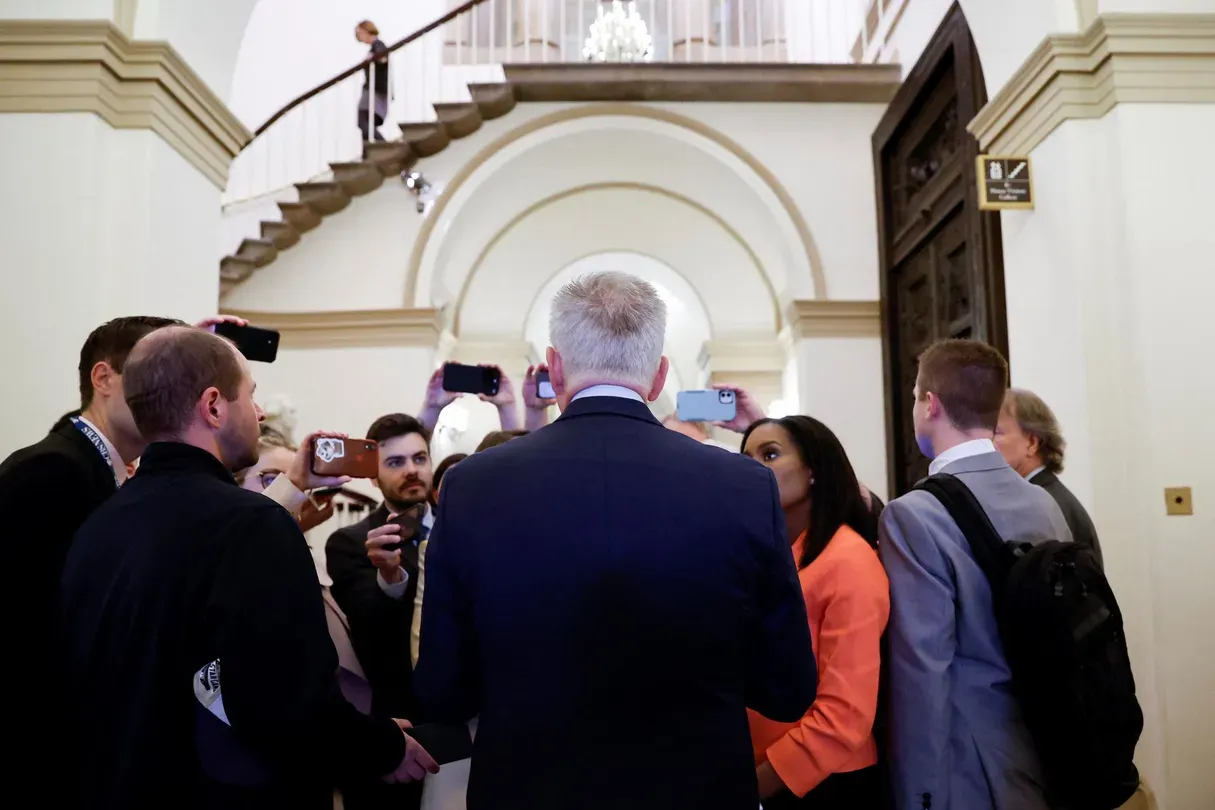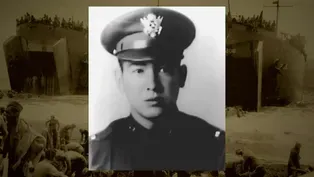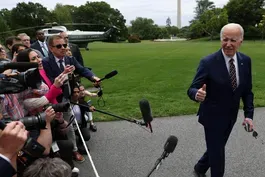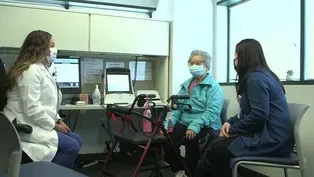

May 28, 2023 - PBS News Weekend full episode
5/28/2023 | 26m 45sVideo has Closed Captions
May 28, 2023 - PBS News Weekend full episode
Sunday on PBS News Weekend, the latest on the agreement in principle that the White House and Congressional GOP reached on a debt ceiling deal. Why having in-person medical interpreters is vital to the health of Asian Americans with limited English proficiency. The story of Capt. Frances Brown Wai’s heroism in World War II. Plus, a grandfather tells his grandson about a special wartime assignment.
Problems with Closed Captions? Closed Captioning Feedback
Problems with Closed Captions? Closed Captioning Feedback
Major corporate funding for the PBS News Hour is provided by BDO, BNSF, Consumer Cellular, American Cruise Lines, and Raymond James. Funding for the PBS NewsHour Weekend is provided by...

May 28, 2023 - PBS News Weekend full episode
5/28/2023 | 26m 45sVideo has Closed Captions
Sunday on PBS News Weekend, the latest on the agreement in principle that the White House and Congressional GOP reached on a debt ceiling deal. Why having in-person medical interpreters is vital to the health of Asian Americans with limited English proficiency. The story of Capt. Frances Brown Wai’s heroism in World War II. Plus, a grandfather tells his grandson about a special wartime assignment.
Problems with Closed Captions? Closed Captioning Feedback
How to Watch PBS News Hour
PBS News Hour is available to stream on pbs.org and the free PBS App, available on iPhone, Apple TV, Android TV, Android smartphones, Amazon Fire TV, Amazon Fire Tablet, Roku, Samsung Smart TV, and Vizio.
Providing Support for PBS.org
Learn Moreabout PBS online sponsorshipJOHN YANG: Tonight on "PBS News Weekend," the latest on the agreement in principle that the White House and congressional Republicans reached on a debt ceiling deal, then why having in person medical interpreters is so vital to the health of Asian Americans with limited English proficiency.
WOMAN: For me, it's worth it when I realized oh, I was there to provide that communication that information to them so they can make better decisions.
JOHN YANG: And the story of Captain Francis Brown Wai's heroic service to the nation and World War II, and his long and winding road to the Medal of Honor.
(BREAK) JOHN YANG: Good evening.
I'm John Yang.
Now that the bargaining is done, the sales job has begun.
Today, leaders in both parties began briefing lawmakers on the deal that President Biden in House Speaker Kevin McCarthy reached last night to raise the debt ceiling and limit new spending.
If Congress passes it by June 5, it will avert a potentially calamitous national default.
Here's what we know about the contours of the tentative deal.
It would extend the nation's debt limit until 2025 after the 2024 elections, implement spending caps mostly maintain spending on defense and veteran's health care and expand work requirements were some adults receiving food stamps.
At the capitol today, Speaker McCarthy told reporters it was the best deal he could get.
REP. KEVIN MCCARTHY, House Speaker: It doesn't get everything everybody wanted.
But that's in divided government.
That's where we ended up I think it's a very positive bill.
And I do want to thank the President's team that he put together very professional, very smart, very strong beliefs that are different than ours.
And I think at the end of the day, people can look together to be able to pass this in the House and the Senate.
JOHN YANG: Speaking on CBS News Face the Nation House, Minority Leader Hakeem Jeffries said the Agreement protects some Democratic priorities.
REP. HAKEEM JEFFRIES, House Minority Leader: The agreement that was reached in principle by President Biden does several important things.
In addition to avoiding a devastating default that would hurt everyday Americans, it protects Social Security.
It protects Medicare, it protects Medicaid.
JOHN YANG: Parts of the deal are sure to displease the most conservative House Republicans and the most liberal House Democrats and that could complicate passage.
Let's dig into this with congressional correspondent Lisa Desjardins and NPR Senior Political Editor Domenico Montanaro.
So Lisa, crisis averted we can all go home.
LISA DESJARDINS: Nothing has been that easy for years and especially not with Congress.
It is actually going to be a dramatic couple of days here, John, figuring out especially if the votes are there for this to pass in the House.
It's exactly what you just mentioned.
Not clear that enough house conservatives will back this to combine with enough Democrats.
Let's talk about the conservatives first.
A glaring siren went out on Twitter this morning from a couple of conservatives one of them especially Chip Roy.
I want to show you something that he retweeted from another conservative Senator Rand Paul writing about the deal.
This was fake conservatives agreeing to fake spending cuts.
Now, Chip Roy has been on this program our viewers know him well.
He's important for a few reason.
He's a thought leader among conservatives.
He was one of the holdouts with McCarthy when he was trying to become a speaker, but he also sits on the House Rules Committee, John, he and if two others join him and there are two others who may not like this deal.
Nothing will even get out of committee.
So McCarthy really has to deal with these questions from the right that he didn't get enough.
On the left progressives really up in arms over the work required admits they're learning the details so we'll see how that lands.
JOHN YANG: Lisa, in broad terms, what does this tentative deal do to future federal spending?
LISA DESJARDINS: It does cap spending in a way that we haven't seen.
It ends what has been an incredible spending binge by Congress over the last four or five years Congress and the White House together.
However, it really -- it reshapes the debt curve, but not as much as some people would say needs to happen.
It's a step forward in terms of the debt.
Now, on the other hand, it will mean cuts for some government agencies, we don't know which ones there will be real world effects.
And those work requirements for food stamps, specifically, those could affect thousands of people.
On one hand, Republicans say maybe more people will go out and get a job.
And the other hand, Democrats say no, thousands of people could lose a critical benefit.
JOHN YANG: Domenico, all along it seems these negotiations.
So what we've known about these negotiations have been on the Republican terms, the spending cuts, the work requirements.
Did the White House feel pressured to get this done?
DOMENICO MONTANARO, NPR: Well, we know that the White House had basically said that they were abstaining from negotiating over this because they felt like morally, it was not the right thing to do.
Now, Republicans control one chamber of Congress.
And eventually if they were going to hold out the White House was going to have to come on board as well.
And you know, President Biden has been able to get deals done over the years with Republicans.
He was one person who had negotiated on this very thing in 2011.
In previous years, right.
So, we know that Biden was somebody who's been targeting the middle as well.
And you know, we've been talking about the extremes on the left and the right, boy, political messaging wise, this being kicked past 2024.
And Biden being able to say, look, we made a deal that was compromised, and I'm targeting the middle, that sounds like music to his ears when it comes to being able to win over those swing voters.
JOHN YANG: And on the other side, Speaker McCarthy, I think a lot of people remember the 15 ballots it took for him to get the office.
Has his stature been raised by this?
DOMENICO MONTANARO: Well, I think if this does get passed, right, then this will be a huge sigh of relief for McCarthy, because this will probably be the last test of something real that he has to get past other than potential other show votes, because this has to get done.
This isn't something that, you know, they were looking to get some kind of compromise bill done, this is something that they have to pass otherwise, the results would be catastrophic.
So, pushing this past 2024, past that election, McCarthy will be able to say that he was able to work with the White House able to get something done, and that it does help show that he was able to, you know, get something through even in a conference that isn't necessarily prone to want to compromise, JOHN YANG: Lisa, what's coming ahead, you talked about the possibility of may not get out of rules may not even get to the floor.
But what should we be looking for in the days ahead?
LISA DESJARDINS: Well, the hoped for plan by the leaders who want this to pass is that it would get to the House floor for a vote on Wednesday.
Now, let's talk about when the deadline is it's a week from Monday.
So that just leaves nearly five days to get through the House and then get through the Senate, the Senate is so slow.
And it can be slowed down as much as possible by people like Rand Paul, who don't like this deal.
If you run the clocks in the Senate, it's almost like the math doesn't quite work.
I have a feeling once they get through one vote and they start going, perhaps if the markets react and things will speed up.
I think it's all to say, John, this is very close.
Getting this far is extraordinary.
This was a hard deal to make.
But it is still like trying to maneuver an aircraft carrier through a sea full of icebergs.
They are not through it yet the next week will be critical.
DOMENICO MONTANARO: But sometimes they're able to put, you know, like a speedboat behind the aircraft carrier or they'll jump on vote and go on some other vehicle because they somehow figure out different kinds of rules to get things through when they want to do it quickly.
So we'll see if that winds up becoming the case.
But if there is this kind of market pressure, in particular, where you have middle of the road Democrats and those sort of Main Street Republicans, they hear that I think there could be some pressure to move more quickly.
JOHN YANG: Lisa, whenever we come to the precipice of a default, there's always talked about doing away with the debt ceiling.
Is there's talk about that now.
And do you think it would happen?
LISA DESJARDINS: There has been talk about that, but there is not -- it's not very loud.
And it's not by the most muscular forces in Congress right now.
Both parties, it's sort of like the filibuster.
They're worried that when they're out of power, it's something that they can use as a tool.
Republicans more than Democrats, but it's not serious talk of getting rid of it right now.
JOHN YANG: Lisa Desjardins, Domenico Montanaro, thank you very much.
DOMENICO MONTANARO: Thank you.
Lisa Desjardins: Welcome.
JOHN YANG: There is other news, the Texas State Senate is preparing for a trial of the State's Attorney General Ken Paxton.
Last night the Texas House voted overwhelmingly to impeach Paxton.
He's a Republican and both chambers are controlled by Republicans.
The impeachment triggered Paxton immediate suspension from office.
The Senate trial will determine whether he's removed altogether.
The 20 Articles of Impeachment ranged from charges of taking bribes to obstruction of justice and abuse of public trust.
Paxton, a Trump ally who wants as the U.S. Supreme Court to overturn the 2020 election has denied any wrongdoing.
In Turkey President Recep Tayyip Erdogan won today's runoff presidential election, his supporters took to the streets to celebrate another five years in office.
He beat Kemal Kilicdaroglu who promised to return to parliamentary democracy.
Erdogan's 20 year tenure is consolidated power into a near autocracy.
Erdogan overcame public unhappiness over Turkey's crippling inflation and the government response to a devastating earthquake three months ago.
In Ukraine, there was a massive barrage of Russian suicide drones overnight.
The capital Kyiv was especially hard hit by the Iranian made drones.
Kyiv was preparing to mark the anniversary of its founding.
The Ukrainian military said it shot down more than 40 drones over the Capitol.
And American Josef Newgarden has won today's Indianapolis 500.
On the final lap, he overtook Swedish driver Marcus Eriksen who won last year.
Today's crowd at the Indianapolis Motor Speedway was one of the biggest in decades.
Still to come on "PBS News Weekend," on this Memorial Day weekend a World War II heroics of Captain Francis Brown Wai, and an army bugler tells his grandson about his special wartime assignment.
(BREAK) JOHN YANG: For many immigrants a mastery of everyday English doesn't mean they feel comfortable in all settings like in a doctor's office.
That's where medical interpreters play a crucial role.
But as Ali Rogin reports, access to these highly skilled professionals isn't guaranteed for many Asian American and Pacific Islander communities.
BEA HOANG, Owner, B Jewelry: This one is good luck and happiness.
ALI ROGIN: In San Francisco's Chinatown B Hwang sells jewelry and other Chinese goods as she has for the last 30 years.
BEA HOANG: The bowling alley.
Yes.
ALI ROGIN: She calls her English halting but she's fluent in salesmanship.
BEA HOANG: It's Chinese assemble me meaning is a money.
BEA HOANG (through translator): I think the key to my success is my warm and welcoming service.
I try to be inviting to my clients and I don't pressure them to buy anything.
ALI ROGIN: In her shop, she strings English together as easily as beads on twine.
But outside it's different.
Even routine doctor's appointments can feel foreign.
So B usually requested interpreter to speak her native Cantonese, a language spoken by over 85 million people worldwide.
BEA HOANG (through translator): They want to call it is essential to have someone who is able to translate for me while attending medical appointments.
If there's information I don't understand, it can be pivotal to my health.
ALI ROGIN: B is one of about 148,000 or 18 percent of San Franciscans who speak a form of Chinese at home.
Almost 90,000 of them have limited English language proficiency or LEP.
But B is one of the lucky ones.
Many immigrant communities don't have access to the same types of language services.
San Francisco's Chinatown is one of the oldest and largest in the United States dating back to the 1850s.
To this day, it's a central hub for Chinese American culture and life.
But there are also many resources and services available to this community outside these gates.
Northeast Medical Services or NEMS provides many of those services.
At 14 clinics in the Bay Area, 90 percent of their patients are Asian, most are low income and prefer to speak their native language.
NEMS offers culturally relevant care like acupuncture, and routine screenings for conditions that are particularly prevalent in Asian American communities like hepatitis B. Dr. Amy Tang is the director of Immigrant Health at NEMS.
She says screening for and treating hepatitis and other common health care issues here reduces the risk of patients failing to follow up with specialists because of language barriers.
DR. AMY TANG, Director of Immigrant Health, North East Medical Services: It's really important that we train our providers to manage it in the primary care setting and not have to refer out to specialists every time since it's so common.
ALI ROGIN: Dr. Tang speaks Mandarin and many staff members are at least bilingual.
Most of the patients at this NEMS location are Chinese American.
AMY TANG: We can also probed further about maybe reasons for reluctance or understand some of the cultural background norms of why they've may be reluctant to try this medication or their fear about a side effect, or their concern about a vaccine.
ALI ROGIN: When doctors and nurses can't speak a patient's language they'll use one of these devices which connect to interpreters over video or the phone but calls can get dropped and wait times for interpreters can drag on past the appointment time.
AMY TANG: For instance, I had a patient yesterday who spoke Indonesian.
And she of course wanted an interpreter rightly so.
There wasn't one available they said they would call back in 20 minutes with an update, and they finally did of course, our visit was already over.
ALI ROGIN: But even patients who speak everyday English can miss out on medical nuances.
Melody Schiaffino is a professor at UC San Diego School of Public Health.
MELODY SCHIAFFINO, University of California San Diego: If your doctor can't understand you, you can't communicate with them, then you're more likely also not to be able to adhere to the treatment regimen.
And so what could be something that we can easily manage or manage with proper care ends up becoming catastrophic in many cases.
WOMAN: Hi, are you ready?
ALI ROGIN: That's why the gold standard is in person medical interpreters.
Alyes Wong is a staff interpreter at U.C.
San Francisco hospital and a certified in both Mandarin and Cantonese.
WOMAN: So I'm going to look in your ears first.
ALI ROGIN: Today she's helping a Cantonese speaking patient get fitted for a new hearing aid.
Wong was born in Hong Kong.
As a child, her family moved first to England and then to Hawaii.
They spoke Cantonese at home.
ALYES WONG, UCSF Interpreting and Translation Services: I think a lot of immigrant kids go through this, where you have to, you know, ad hoc interpret for your mom or your dad, I realized, wow, I think I could help people that way.
ALI ROGIN: She says interpreters have to convey both the words and the intentions and desires of the patient and the doctor that can at times be hard on the interpreters.
ALYES WONG: You tend to develop something that we'll call vicarious trauma.
And that becomes quite, you know, emotionally heavy for me.
It's worth it when I realized oh, I was there to provide that communication, that information to them so they can make better decisions.
ALI ROGIN: Wong went through 40 hours of training to get certified as a medical interpreter.
But that doesn't account for years of language and medical study.
ALYES WONG: As a doctor you may be, you know, you go into a specialty and you're you know that specialty inside out.
For interpreters, we go to different specialties.
We jump from one to the other from maybe, you know, neonatal, and then now we're going to cardiology.
And so we have to learn all the basics of those terms.
NATALYA MYTAREVA, Certification Commission for Healthcare Interpreters: It takes pretty much as much time as it takes a person to become a qualified nurse or doctor or in other healthcare.
ALI ROGIN: Natalya Mytareva is the executive director of the Certification Commission for Healthcare Interpreters, which administers the program that certified Alyes.
Mytareva says recruiting interpreters is difficult, but it's even harder to retain them.
NATALYA MYTAREVA: As they get involved more with healthcare.
They see the attraction of becoming nurses, physicians, other health care providers and they just move out after being, you know, in the field of interpreting for three five years.
ALI ROGIN: That helps explain why there are so few highly skilled interpreters in the United States.
For example, there are 388 certified Mandarin medical interpreters and 177 Cantonese nationwide for more than 900,000 Chinese language speakers who do not speak English well or at all.
Several laws mandate that all federally funded health care programs provide meaningful access to linguistically appropriate health care.
But those are loosely defined terms with few enforcement mechanisms.
MELODY SCHIAFFINO: We really only get a count of self-reported hospital data that indicates yes, we are offering some level of linguistic and translation services.
But the quality of those linguistic and translation services is not necessarily clarified.
The problem, I think a lot of times is that the onus and the burden is on the patient.
And that is inappropriate because this is already a vulnerable and marginalized population.
ALI ROGIN: Only 16 states directly reimburse providers for language services provided to Medicaid and children's health insurance program enrollees.
In 2009, California became the first state to require health insurance companies to cover interpretation services.
Schiaffino says more states should follow suit.
MELODY SCHIAFFINO: I think considering something like that I think would be very beneficial because third party payers are able to really take advantage of these systemic benefits and economies of scale to really organize and deliver these opportunities.
ALI ROGIN: But unless those changes are made interpreters like Alyes play a crucial role in this patchwork system.
You have to be really passionate to do this.
ALYES WONG: Yes.
It's the passion for language.
It's for me, it's the passion for language.
The passion to you know, also to remember where we came from, and thinking about, you know, how we came -- when we first came here, the struggles we had, how do I help the new people come in.
WOMAN: I'm going to look in your ears first.
ALI ROGIN: Because when language isn't a barrier, doctors can focus on their primary job up taking care of their patients.
For "PBS News Weekend," I'm Ali Rogin in San Francisco.
JOHN YANG: On this Memorial Day weekend and for Asian American and Pacific Islander Heritage Month, we look at the lesser known story of Francis Brown Wai and his heroic service to the nation.
MAN: Date will live in infamy.
JOHN YANG: The Japanese attack on Pearl Harbor in 1941 drew the United States into World War II and altered the life of Francis Brown Wai than a young Army Lieutenant stationed on Oahu.
The son of a Hawaiian mother and a Chinese immigrant father, Wai was a natural athlete playing football and other sports at UCLA.
It was during the 1944 allied campaign to liberate the Philippine Islands from Japan that Wai by then a captain displayed selfless sacrifice.
According to his citation, Wai landed on a beach codename Red and found the soldiers already ashore leaderless, disorganized and pinned down by machine gunfire.
Even though he was wounded he assumed command and lead soldiers inland sometimes deliberately drawing fire to expose the enemy's positions.
He died while leading the assault on the last remaining Japanese pillbox.
His commander recommended him for the Medal of Honor the highest military honor.
But when the paperwork reached Washington, it was downgraded to the Distinguished Service Cross.
In 1996, Congress directed the Pentagon to review military records to look for discrimination in the Honors awarded Asian Americans during World War II.
The defense secretary determined that Wai deserved the Medal of Honor.
BILL CLINTON, Former U.S. President: They risked their lives above and beyond the call of duty.
And in so doing, they did more than defend America.
In the face of painful prejudice, they helped to define America at its best.
JOHN YANG: In June 2000, President Clinton presented Wai's brother Robert with the metal why should have been awarded in the first place.
Captain Wai extraordinary heroism and devotion to duty are in keeping with the highest traditions of military service and reflect great credit on him his unit and the United States Army.
And now on this day before Memorial Day, a piece from StoryCorps.
In the final days of World War II, U.S. Army Sergeant Harrison Wright was stationed in a small Belgian village near the German border.
He tells his grandson Sean Guess about a special assignment.
MAN: I was 19-year-old boy and a blue bugle in a outfit.
If a young man is killed in action, or dies defending his country, you blow caps over his grave.
And it just -- there's no way to describe it.
The emotion that you feel knowing that there was notice going out.
And I remember that war was over just a few days and they asked me to blow taps for all who died in the war.
We climbed this high heel, it was like a mountain top and my battalion to bottom now blew blue those taps.
And when I did, the man said it floated out across all it barely and said it was beautiful.
They were all telling me how good it sounded and what a tribute it was to our fallen comrades.
JOHN YANG: Harrison Wright died in 2015 at the age of 91.
For more stories like his, go to storycorps.org.
And tomorrow, Taps will be echoing across the 155 national cemeteries around the country.
So amid the barbecues and mattress sales, I hope you'll take some time to think about the hundreds of thousands of men and women who gave their lives so the rest of us could enjoy things like that.
And that is "PBS News Weekend: for this Sunday.
On Mondays PBS NewsHour, the latest on the reelection of Turkish President Recep Tayyip Erwan in today's run off.
I'm John Yang.
For all of my colleagues, thanks for joining us.
Have a good week.
An Army bugler’s story about his special wartime assignment
Video has Closed Captions
Clip: 5/28/2023 | 2m 23s | An Army bugler’s story about his special wartime assignment (2m 23s)
The heroic actions of Capt. Francis Brown Wai in WWII
Video has Closed Captions
Clip: 5/28/2023 | 2m 27s | The heroic actions of Capt. Francis Brown Wai in World War II (2m 27s)
What we know about Biden and McCarthy’s debt limit deal
Video has Closed Captions
Clip: 5/28/2023 | 7m 26s | What we know about Biden and McCarthy’s tentative deal to raise the debt limit (7m 26s)
Why medical interpreters can be a vital but scarce resource
Video has Closed Captions
Clip: 5/28/2023 | 8m 33s | For many Asian Americans, medical interpreters are a vital but scarce resource (8m 33s)
Providing Support for PBS.org
Learn Moreabout PBS online sponsorshipSupport for PBS provided by:
Major corporate funding for the PBS News Hour is provided by BDO, BNSF, Consumer Cellular, American Cruise Lines, and Raymond James. Funding for the PBS NewsHour Weekend is provided by...














